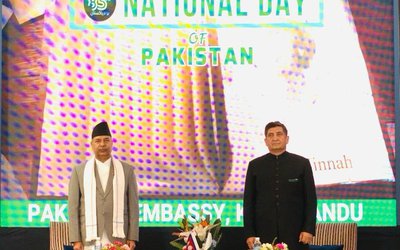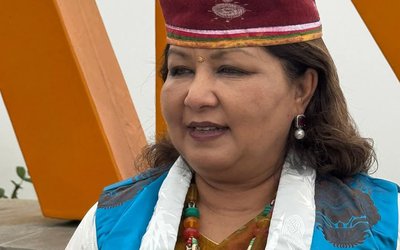With our Federal and Pradesh elections on the horizon, it is but natural that political thoughts should come flooding into my mind. These came quickly and impromptu whilst my fingers had to work super fast to note them down on my laptop. I am at a quandary as to who to vote for as I gloss over the pros and cons over the actions of politicians in the past. My mind recollects Franz Kafka’s words, ‘One idiot is one idiot. Two idiots are two idiots. Ten thousand idiots are a political party.’ Should we therefore vote for independent candidates this time round? What do my readers feel?
There are unlimited numbers of universal sayings about politics. Robert Louis Stephenson’s was, ‘Politics is perhaps the only profession for which no preparation is thought necessary.’ How true as we look around. Being a politician is a special class for there are neither permanent friends nor foes in politics. Anything goes. Besides this, the experience of power is heady and absolute power corrupts absolutely. This is as Lord Upton says, ‘Power tends to corrupt and absolute power corrupts absolutely.’ No surprise then that a Native American proverb advises, ‘Never follows a leader who is more in love with power than people.’ To deal with them Margaret Thatcher, the first lady prime minister of UK advises, ‘Both politicians and nappies need to be changed for the same reason.’
Going over the history of the England one learns that the country was a Republic under Oliver Cromwell from 1649 CE to 1660 CE, when monarchy was once again restored. One recalls to mind the words of King Farouk of Egypt who, when dethroned by Gen. Naguib remarked, ‘There are only five kings in the world, four in the pack of cards and one King of England.’ He was ignoring all the monarchies of Scandinavia and the Sheikdoms of the Middle East which presently amount to twenty? In this context it is worth remembering that it was England and later France, both of whom have the distinction of beheading a monarch each prior to becoming republics. The outpouring of love and respect for late Queen Elizabeth II shows the present situation.
Many years ago I read that the British Parliament with its long history of supremacy in the world was the ‘Mother of Parliaments’. In fact an Englishman, Sir Ivor Jennings had helped to make our constitution for the establishment of Panchayat Raj. Our voting system was initially the ‘First Past the Post’ though it has now given way to the Proportional System criteria. At this point I remembered reading about a situation, some two hundred years ago, when a member of the British Parliament was asked about his loyalty vis-à-vis between his financier and the voters who elected him. His reply was that it was the financier. Besides, the British are supposed to be always for fair play and this brings to my mind an incident during one of the elections in UK when a house owner was asked about tenants living in his house eligible for voting. This man gave human names to the six cats that he had as pets and sent the list to the authorities. The cats did not vote for the authorities found out and took the landlord to court!
Another story narrated by Abraham Lincoln during an election rally is classical. In those times in the US, only those who possessed land, house or something were allowed to vote. A poor Black American owned a donkey and as per the rule was allowed to vote. The next time however, the donkey had died and so the Black American was barred from voting. Lincoln asked who was voting, ‘Was it the Black American or the donkey?’
We, in Nepal are at a stage when we no longer believe what our current leaders have been telling us. We are all waiting Nov. 20th when we can sweep the old order away and bring fresh blood to lead this country of ours. Will such an eventuality take place? Do we have the capability to make sweeping changes?
Referendum is a means of gauging national opinion on various serious issues and getting the people’s feedback; to solve various issues has been increasing since 1970 CE. Referendum is defined by Wikipedia as a direct vote by the electorate on a proposal, law or political issue. The outcome may result in the adoption of a new policy or specific law or can be only advisory in some cases. . It is interesting to note that since this concept was put into practice in 1848, the Swiss have held 800 referendums on various issues. Since the 19th Century, innumerable referendums have been held around the world. In Nepal, on 2nd May 1980 a referendum was held during King Birendra’s reign to decide on the future form of government. The option was to vote for the GoldenYellow i.e. Panchayat or Blue for full democracy. The Golden Yellow won. Such is life. Then over the years our politicians, even of different colours, have been stating that they will soon turn Nepal into a Switzerland or Singapore. Time has confirmed the adage ‘Live in hope and die in despair’.
The bottom line in all this is the words of Plato who said centuries ago: ‘The price good men pay for indifference to public affairs is to be ruled by evil men.’ Though centuries have passed, the mentality amongst the people has been slow to change. Our practice always, as said by Aesop also centuries ago, is to ‘Hang the petty thieves and appoint the great ones to public office’.
We in Nepal have been putting up with our old and tired leaders for too long. It is time for them to go for as Abe Lincoln said, ‘You can fool some of the people all the time, and all the people some of the time, but you cannot fool all of the people all of the time’. Will Durant however counters Lincoln by saying, ‘It may be true that you can’t fool all the people all the time, but you can fool enough of them to rule a large country!’ A warning by Ed. Murrow, journalist goes, ‘A nation of sheep will soon have a government of wolves’!
The author is a retired medical doctor and writes fiction under the pen name of Mani Dixit also. Website: www.hdixit.org.np. Twitter: @manidixithd

Hemang Dixit
The author writes fiction under the name of Mani Dixit. Website: www.hdixit.org.np. Twitter: @manidixithd
- Top Heavy
- Sep 20, 2023
- Most Able?
- Sep 04, 2023
- Changing Times
- Aug 21, 2023
- Nepali Shenanigans
- Aug 03, 2023
- Budget Naataks
- Jun 29, 2023














